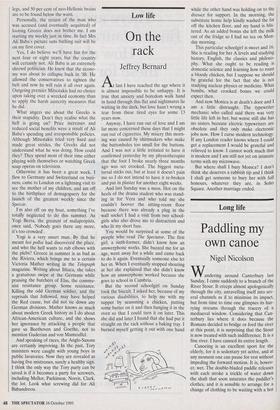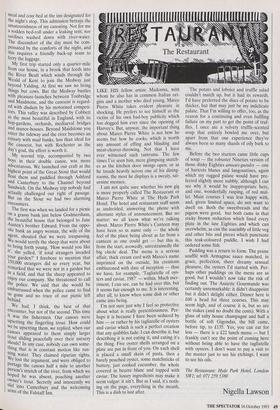Long life
Paddling my own canoe
Nigel Nicolson
Wandering around Canterbury last Sunday, 1 came suddenly to a branch of the River Stour. It creeps almost apologetically through the city, unravelling itself into sev- eral channels as if to minimise its impact, but from time to time one glimpses its hur- rying streams through the tracery of a mediaeval window. Considering that Can- terbury lies where it does because the Romans decided to bridge or ford the river at this point, it is surprising that the Stour is now treated with such indifference. It is a fine river. I have canoed its entire length.
Canoeing is an excellent sport for the elderly, for it is sedentary yet active, and at any moment one can pause for rest without impeding the forward motion. It is, howev- er, wet. The double-bladed paddle releases with each stroke a trickle of water down the shaft that soon saturates the paddler's clothes, and it is sensible to arrange for a change of clothing to be waiting with a hot
meal and cosy bed at the inn designated for the night's stop. This admission betrays the amateurishness of my canoeing. Not for me a sodden bed-roll under a leaking tent, nor sardines washed down with river-water. The discomfort of the day must be com- pensated by the comforts of the night, and this requires a friendly back-up team to ferry the luggage. My first trip started only a quarter-mile from our house, in a brook that feeds into the River Beult which winds through the Weald of Kent to join the Medway just beyond Yalding. At first we saw no living things but cows. But the Medway bustles with pleasure-launches between Tonbridge and Maidstone, and the canoeist is regard- ed with disdain by his motorised competi- tors. This valley was described by Cobbett as the most beautiful in England, with its hop-gardens, orchards, mediaeval bridges and manor-houses. Beyond Maidstone you enter the tideway and the river becomes an estuary with mud banks, less than ideal for the canoeist, but with Rochester as the day's goal, the effort is worth it.
My second trip, accompanied by two boys in their double canoe, was more adventurous. We launched our craft at the highest point of the Great Stour that would float them and paddled through Ashford and Canterbury to the Channel beyond Sandwich. On the Medway trip nobody had actually challenged our right of passage. But on the Stour we had two alarming encounters.
The first was when we landed for a picnic °11 a grassy bank just below Godmersham, the beautiful house that belonged to Jane Austen's brother Edward. From the oppo- site bank an angry woman, the wife of the agent, shouted that we were trespassing. We would terrify the sheep that were about to bring forth young. 'How would you like It', she yelled, 'if total strangers invaded Your garden?' I forebore to mention that 150,000 strangers did so every year, but remarked that we were not in a garden but in a field, and that the sheep appeared to enjoy our company. She threatened to call the police. We said that she would he embarrassed when the police came to find us gone and no trace of our picnic left behind.
We had, I think, the best of that Fncounter, but not of the second. This time It was the fishermen. Our canoes were upsetting the fingerling trout. How could we be upsetting them, we replied, when our Canoes appeared to them simply larger trout sliding peacefully over their nursery shoals? In any case, nobody can own some- thing that is in constant motion like run- ning water. They claimed riparian rights. We lost the argument, and were obliged to Portage the canoes half a mile to another person's stretch of the river, from which we hoped he was absent, poaching another owner's trout. Secretly and innocently we slid into Canterbury and the welcoming arms of the Falstaff Inn.



























































 Previous page
Previous page